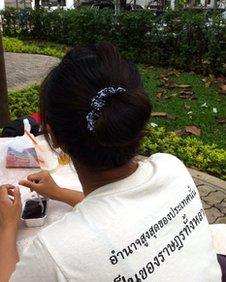Calls for change over Thai 'royal insult' law
- Published

Karntoop says her actions have left her estranged from her family
A heated debate is under way in Thailand over the application of a law designed to protect the monarchy, reports BBC South East Asia correspondent Rachel Harvey. The lese-majeste law, or article 112 of Thailand's criminal code, protects the most senior members of the royal family from insult or threat.
Going to the movies in Thailand has its own special ritual. Ahead of the main feature, a short film is shown about His Majesty the King, a figure revered by the vast majority of Thais.
As the first strains of the music begin, everyone in the cinema is expected to stand in respect.
Three years ago a 16-year-old student chose to remain seated. That decision, along with opinions she posted on internet message boards, have made Karntoop the focus of a hate campaign conducted by royalists.
"Karntoop" is a nickname - she asked that her real name be withheld. I met her at an open-air café at her university campus. She has lost count of the threats made against her.
Once, as she walked along a street, someone threw a shoe at her - a grave insult in Thai culture. The attacker then shouted that she should leave Thailand, warning that next time a knife would be thrown.
Karntoop has paid a heavy price for her acts of defiance. She is estranged from her family by mutual agreement.
"They are supporters of the royalist yellow-shirt movement," she said. "We live on different planets. This issue has torn us apart. I wish they could accept me. But we can't overcome our differences, so it's best we live apart".
Karntoop is now facing a complaint under article 112. If found guilty she faces up to 15 years in jail for each alleged offence. Hers is the latest high-profile case to place the law under scrutiny.
'Roadblock'
Late last year, a 61-year-old grandfather was found guilty of sending text messages deemed to be offensive to the queen.
He was sentenced to 20 years. A Thai-born American citizen is serving two and a half years for posting online translations of a banned biography of the king.

Puangthong Pawakapan says the law has become a barrier to dialogue
The United States, the European Union and human rights groups have expressed concern about the way in which the law is being applied.
Critics say in recent years article 112 has been used as a political weapon to stifle free speech. Now a group of academics has proposed amendments to the controversial law. But the suggestion has sparked a fierce row.
Puangthong Pawakapan, who teaches political science at Chulalongkorn University in Bangkok, backs the changes. She says the law has become increasingly politicised as Thailand has become increasingly divided.
She points out that the number of cases has risen sharply since the military coup of 2006, which removed former Prime Minister Thaksin Shinawatra from power.
"The law has been abused, used against political opponents especially those opposed to the coup," she said.
"People are unable to discuss things openly because of the threat of the law. But there is a growing awareness that the law itself has become a roadblock to a political solution."
'Too sensitive'
One of the justifications put forward by those who supported the 2006 coup, was that Mr Thaksin was undermining the royal institution - an allegation he vehemently denies.
His supporters, the red shirts, are routinely accused by their bitter political rivals, the ultra-royalist Yellow Shirts, of being anti-monarchist.

Pichai Ratnatilaka na Bhuket says the issue is too sensitive to tackle
The king is central to Thai society and revered by the vast majority of his citizens.
But the lese-majeste law has become a lightning rod for arguments about the future direction of the country.
As a consequence, whether or not it was the intention of either side, the monarchy itself risks being dragged into the political mire.
Anyone can bring a complaint of lese majeste and police are obliged to investigate.
The details of the charges are rarely made public for fear of repeating the sin. Critics say the room for interpretation is too wide and the penalties too severe.
Those arguing for a change in the law insist they do not have republican leanings, but they say amendments are urgently needed to prevent further abuse.
Royalists denounce such suggestions as dangerously subversive. Pichai Ratnatilaka na Bhuket says he supports free speech in general - but the monarchy is an exception.
"Watering down article 112 would be like lowering the status of the king. The king is held in the highest regard, so we mustn't do that" he said.
"It's too sensitive. It would cause more problems in society. Thailand is already divided - amending the law could lead to more violence."
Lonely battle
That view has been backed by the powerful figure of the army chief, General Prayuth Chan-ocha. The main political parties have also issued statements supporting article 112.
In fact the current government, led by Mr Thaksin's sister Yingluck Shinawatra, has stepped up efforts to block websites with content deemed offensive to the monarchy.
Social media - Facebook and Twitter - where anonymity encourages vociferous argument, are now firmly in the government's sights. There is clearly no political appetite to change the status quo.
Karntoop chooses her words carefully when talking about the monarchy. She has had to learn some painful lessons.
"I used to be scared," she said, "but now I'm beyond fear."
At age 19, she is fighting a very lonely battle. "I am exhausted," she said, "but I have no regrets. All this has made me grow up. I believe one day attitudes will change."
But not it seems, anytime soon. Discussing the role of the royal family in Thai society, let alone criticising the monarchy, remains taboo in Thailand. Even the law which protects the institution appears untouchable.
- Published29 November 2011
- Published23 November 2011
- Published10 October 2011